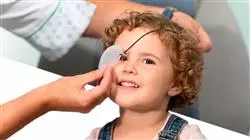University certificate
The world's largest faculty of psychology”
Introduction to the Program
This Postgraduate diploma in Visual Impairment and School Performance will generate a sense of confidence when fulfilling your profession as a psychologist, which will help you grow both personally and professionally"

The role of psychologists in the detection and prevention of vision-related problems is very important. Working on them at an early stage can have a positive influence on the schoolchildren's lives and even improve their academic performance.
With the aim of providing graduates with an in-depth knowledge of both the symptomatology and the problems associated with visual impairment in the classroom, this University Expert in Visual Impairment and School Performance is a program that offers a broad and complete vision of the complex world of the visual system and its implications in different areas of life, including academia. Likewise, it brings together the different theoretical and practical approaches so that any interested professional will first know what the visual system is, how it develops, what deficiencies it may present, how to detect them, and what interventions to carry out, all with the objective of making it applicable to his or her job.
It is a complete 100% online program designed by experts in psychology and pedagogy and oriented exclusively to the professional improvement of graduates. In it you will not only find the best theoretical content, but you will also find real clinical cases to contextualize the information and a lot of additional material with which you will be able to deepen in each section of the syllabus that you consider most relevant to your profession.
The professional improvement you were looking for is at your fingertips with this University Expert in Visual Alterations and School Performance"
This Postgraduate diploma in Visual Impairment and School Performance contains the most complete and up-to-date program on the market. The most important features include:
- Practical cases presented by experts in psychology applied to academics
- The graphic, schematic, and practical contents with which they are created, provide scientific and practical information on the disciplines that are essential for professional practice
- Practical exercises where self-assessment can be used to improve learning
- Its special emphasis on innovative methodologies
- Theoretical lessons, questions to the expert, debate forums on controversial topics, and individual reflection assignments
You will have on your resume a degree endorsed by the world's largest online university and a team of industry experts"
The program’s teaching staff includes professionals from the sector who contribute their work experience to this educational program, as well as renowned specialists from leading societies and prestigious universities.
Its multimedia content, developed with the latest educational technology, will provide the professional with situated and contextual learning, i.e., a simulated environment that will provide an immersive education programmed to learn in real situations.
The design of this program focuses on Problem-Based Learning, by means of which the professional must try to solve the different professional practice situations that are presented throughout the academic course. For this purpose, the student will be assisted by an innovative interactive video system created by renowned experts.
Take the opportunity to learn about the latest advances in this field in order to apply it to your daily practice as a psychologist"

Increase your decision-making confidence by updating your knowledge with this University Expert course"
Why study at TECH?
TECH is the world’s largest online university. With an impressive catalog of more than 14,000 university programs available in 11 languages, it is positioned as a leader in employability, with a 99% job placement rate. In addition, it relies on an enormous faculty of more than 6,000 professors of the highest international renown.

Study at the world's largest online university and guarantee your professional success. The future starts at TECH”
The world’s best online university according to FORBES
The prestigious Forbes magazine, specialized in business and finance, has highlighted TECH as “the world's best online university” This is what they have recently stated in an article in their digital edition in which they echo the success story of this institution, “thanks to the academic offer it provides, the selection of its teaching staff, and an innovative learning method aimed at educating the professionals of the future”
A revolutionary study method, a cutting-edge faculty and a practical focus: the key to TECH's success.
The most complete study plans on the university scene
TECH offers the most complete study plans on the university scene, with syllabuses that cover fundamental concepts and, at the same time, the main scientific advances in their specific scientific areas. In addition, these programs are continuously being updated to guarantee students the academic vanguard and the most in-demand professional skills. In this way, the university's qualifications provide its graduates with a significant advantage to propel their careers to success.
TECH offers the most comprehensive and intensive study plans on the current university scene.
A world-class teaching staff
TECH's teaching staff is made up of more than 6,000 professors with the highest international recognition. Professors, researchers and top executives of multinational companies, including Isaiah Covington, performance coach of the Boston Celtics; Magda Romanska, principal investigator at Harvard MetaLAB; Ignacio Wistumba, chairman of the department of translational molecular pathology at MD Anderson Cancer Center; and D.W. Pine, creative director of TIME magazine, among others.
Internationally renowned experts, specialized in different branches of Health, Technology, Communication and Business, form part of the TECH faculty.
A unique learning method
TECH is the first university to use Relearning in all its programs. It is the best online learning methodology, accredited with international teaching quality certifications, provided by prestigious educational agencies. In addition, this disruptive educational model is complemented with the “Case Method”, thereby setting up a unique online teaching strategy. Innovative teaching resources are also implemented, including detailed videos, infographics and interactive summaries.
TECH combines Relearning and the Case Method in all its university programs to guarantee excellent theoretical and practical learning, studying whenever and wherever you want.
The world's largest online university
TECH is the world’s largest online university. We are the largest educational institution, with the best and widest online educational catalog, one hundred percent online and covering the vast majority of areas of knowledge. We offer a large selection of our own degrees and accredited online undergraduate and postgraduate degrees. In total, more than 14,000 university degrees, in eleven different languages, make us the largest educational largest in the world.
TECH has the world's most extensive catalog of academic and official programs, available in more than 11 languages.
Google Premier Partner
The American technology giant has awarded TECH the Google Google Premier Partner badge. This award, which is only available to 3% of the world's companies, highlights the efficient, flexible and tailored experience that this university provides to students. The recognition as a Google Premier Partner not only accredits the maximum rigor, performance and investment in TECH's digital infrastructures, but also places this university as one of the world's leading technology companies.
Google has positioned TECH in the top 3% of the world's most important technology companies by awarding it its Google Premier Partner badge.
The official online university of the NBA
TECH is the official online university of the NBA. Thanks to our agreement with the biggest league in basketball, we offer our students exclusive university programs, as well as a wide variety of educational resources focused on the business of the league and other areas of the sports industry. Each program is made up of a uniquely designed syllabus and features exceptional guest hosts: professionals with a distinguished sports background who will offer their expertise on the most relevant topics.
TECH has been selected by the NBA, the world's top basketball league, as its official online university.
The top-rated university by its students
Students have positioned TECH as the world's top-rated university on the main review websites, with a highest rating of 4.9 out of 5, obtained from more than 1,000 reviews. These results consolidate TECH as the benchmark university institution at an international level, reflecting the excellence and positive impact of its educational model.” reflecting the excellence and positive impact of its educational model.”
TECH is the world’s top-rated university by its students.
Leaders in employability
TECH has managed to become the leading university in employability. 99% of its students obtain jobs in the academic field they have studied, within one year of completing any of the university's programs. A similar number achieve immediate career enhancement. All this thanks to a study methodology that bases its effectiveness on the acquisition of practical skills, which are absolutely necessary for professional development.
99% of TECH graduates find a job within a year of completing their studies.
Postgraduate Diploma in Visual Impairment and School Performance
Visual disturbances can have a significant impact on school performance, since most learning in school is accomplished through sight. Visual disturbances can include problems such as nearsightedness, farsightedness, astigmatism or amblyopia, and can affect the way children see and process visual information.
Introduction to visual impairment and its impact on learning
If not properly treated, visual disturbances can cause eyestrain, headaches, difficulty reading and writing, as well as concentration and memory problems. All of these can hinder learning and cause reduced school performance.
It is important that children receive regular eye examinations to detect and treat any visual problems as early as possible. If a visual disturbance is detected, measures such as the use of corrective lenses, vision therapy or exercises to improve eye coordination can be taken to improve vision and school performance.
This virtual academic program seeks to provide students with comprehensive training in visual impairment and its impact on school performance. Students will learn about the fundamentals of visual impairments and their impact on cognitive development, as well as their assessment and diagnosis. In addition, they will be taught about cognitive neuroscience and the relationship between visual perception and learning, as well as methods and techniques for intervention in visual impairment and visual adaptations to improve learning. The program will also focus on the impact of technologies on visual impairments and the design of strategies for their responsible and effective use. Learning will take place through theoretical and practical modules, which will include exercises, teamwork, and discussions.







